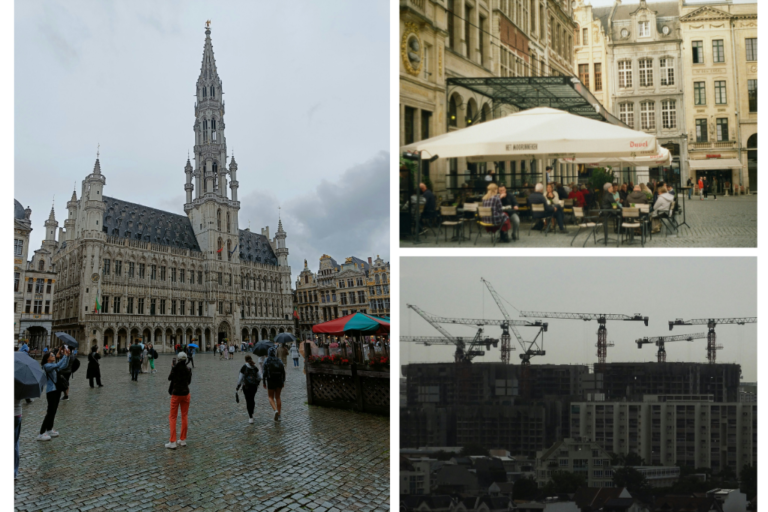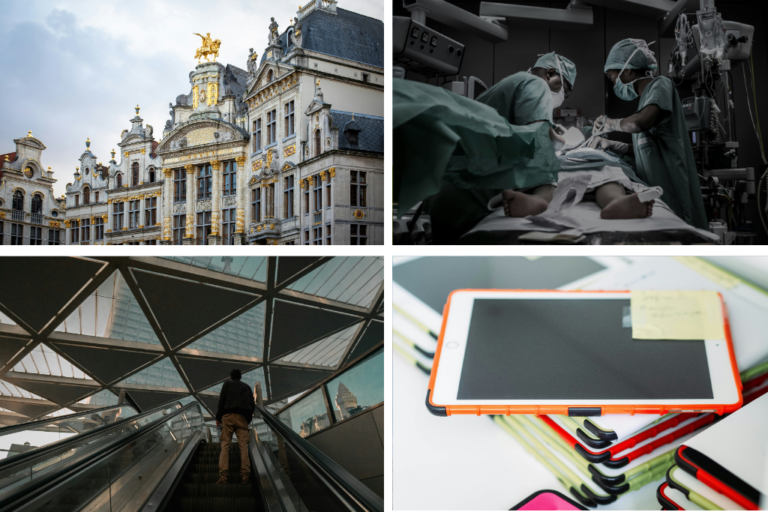How to work in Brussels: Opportunities and requirements
Discover how to work in Brussels: requirements, visas, job opportunities, salaries, and tips for foreigners.
Working in Brussels in 2025 is one of the top choices for international professionals seeking career growth and a great quality of life. The city offers a diverse job market across technology, finance, communication, logistics and services, making it an ideal place to work in Brussels and thrive in the heart of Europe.
However, for foreigners who want to settle in this cosmopolitan city, it’s essential to understand the legal requirements, types of work permits, and current employment conditions. This article offers an up-to-date guide with everything you need to take the first step toward building your career in Brussels.
Advantages of working in Brussels
Working in Brussels is more than just having a job. It means living in a vibrant, multicultural city that serves as Europe’s political hub and offers a dynamic job market. While adapting and managing costs can be challenging, the opportunities and benefits make building a career here truly worthwhile.
- Competitive salaries and stability: Salaries are generally above the European average, and contracts include solid social benefits.
- International environment: Brussels is home to the EU and many international organizations, offering a truly multicultural environment and excellent opportunities for networking.
- Diverse job opportunities: Beyond the political and institutional sector, there are strong job opportunities in technology, finance, communication, logistics, and consulting.
- Multilingualism: Working in Brussels offers the chance to improve your English, French and Dutch, a valuable asset in the European job market.
- Quality of life: The city combines good infrastructure, efficient transportation, and an active cultural scene with museums, festivals, and renowned cuisine.
- Strategic location: Other European capitals such as Paris, Amsterdam, and London can be easily reached from Brussels in just a few hours.
- Work-life balance: Brussels values free time and family life, offering generous vacations and reasonable working hours.

Requirements for working in Brussels
- Visa or work permit: European Union citizens do not need a visa to live and work in Brussels. Non-EU citizens must apply for a work permit or a long-stay type D visa for employment or work relocation.
- Work permits in Belgium: Type A Permit allows you to work indefinitely in any job. Type B Permit is granted for a specific job with a designated employer. The Single Permit combines residence and work authorization in one process and is valid for stays longer than 90 days.
- Registration with the local municipality: Once settled in Brussels, you must register with the local municipality to obtain a residence certificate.
- Employment contract: In most cases, a signed contract with a company in Belgium is required to obtain a permit.
- Health insurance: It is compulsory for working and residing in Brussels , as it is part of the Belgian social security system.
- Equivalence of qualifications: In certain sectors (education, health, engineering), it may be necessary to have qualifications recognized or professional experience accredited.
Tips for starting work in Brussels
Working in Brussels goes beyond just securing a job and meeting legal requirements. It involves adjusting to a multicultural city with its own rhythm and quirks. The city offers many benefits, and keeping a few practical tips in mind can make it easier to settle in and take full advantage of both professional and everyday opportunities.
- Internet connection from day one: Having a reliable internet connection in Brussels is essential for both work and everyday life. For newcomers or short-term visitors, being connected from day one is key for getting around the city, using maps, staying in touch, and handling administrative tasks. A convenient and flexible option is Holafly’s monthly plans, which provide eSIMs for Brussels and the rest of the European Union. This allows you to have internet access as soon as you arrive, without long-term contracts or dealing with local carriers.
- Learn the language: While English is widely used in international settings, French is the most practical language for daily life and work in Brussels. Dutch can also be an advantage in certain companies.
- Adapt your resume: A clear, concise resume in the language of the position you are applying for (French, Dutch, or English) is preferred in Belgium.
- Learn about the job market: Sectors like technology, consulting, logistics, and European institutions have strong demand, while competition is higher in other fields.
- Networking: Attending job fairs, professional events, and international groups in Brussels can help you find opportunities quicker.
- Balance work and personal life: Work-life balance is highly valued in Belgium, so make sure to respect working hours and use your free time to explore the city and its culture.
- Be patient with bureaucracy: Registering with the municipality, handling residency paperwork, or getting documents officially recognized can take time, so it’s important to plan ahead.
- Learn about the cost of living: Brussels is more expensive than other Belgian cities, so it’s wise to plan your budget carefully and negotiate a salary that matches the cost of living.
- Respect cultural diversity: Brussels is a very international city with colleagues from many different countries, so tolerance and flexibility are essential.
- Stay open to growth: Brussels is a hub for many professionals, offering plenty of opportunities for training, career mobility, and growth across Europe.
Types of jobs in Brussels for foreigners
With its strong international presence and status as the home of the European Union, Brussels is an appealing destination for those looking to work abroad. Its dynamic job market offers both specialized roles and opportunities in services and support.
- Finance and banking: Financial advisors, accountants, risk analysts, and auditing professionals.
- European institutions and international organizations: Jobs in administration, public policy, translation, communication, and international relations.
- Administrative and office jobs: Administrative assistants, HR, and support staff in international companies.
- Technology and innovation: Software developers, cybersecurity specialists, data analysts, and systems engineers.
- Consulting and communication: Positions in lobbying firms, communications agencies, and multinational consulting firms.
- Logistics and transportation: Brussels is a strategic hub in Europe, so there are opportunities in logistics management, distribution, and international trade.
- Education and languages: English, French, Dutch, or Spanish teachers, as well as tutoring at international schools.
- Health and social services: Doctors, nurses, and caregivers in healthcare institutions, especially those with recognized qualifications.
- Hospitality and gastronomy: Waiters, cooks, hotel and restaurant staff, who are in high demand in a city with constant tourism.
- Temporary or integration jobs: Cleaning, delivery, customer service, and retail, perfect if you’re just starting out and don’t speak the language yet.
The most in-demand jobs in Brussels for foreigners
Brussels offers plenty of opportunities for foreigners, but demand is higher in certain sectors. European institutions and multinational companies look for candidates with experience, language skills, and adaptability, so knowing which roles are most in demand can help you find a job faster and on better terms.

- Finance and accounting professionals: Auditors, financial analysts, risk managers, and accountants with international certifications.
- Technology and IT specialists: Software developers, systems engineers, cybersecurity experts, and data analysts.
- Consultants and advisors: Specializing in public policy, the environment, European law, and strategic communication.
- Logistics and international trade professionals: Needed in supply chain management and transportation.
- Engineers: Needed in areas such as energy, construction, telecommunications, and sustainability.
- Doctors, nurses, and healthcare personnel: Especially those with qualifications recognized in Belgium.
- Translators and interpreters: For European institutions and multinational companies, with proficiency in several languages.
- Human resources specialists: Focused on international recruitment and multicultural management.
- Language teachers: Mainly English, French, and Spanish in international schools and colleges.
- Experts in sustainability and renewable energy: A growing sector on the European agenda.
Salaries and cost of living in Brussels
Salaries in Brussels are generally competitive compared to other European cities, but they vary widely depending on the sector and level of experience. A qualified foreign professional can earn between $2,700 and $4,900 net per month, while highly specialized fields like finance, international consulting, or technology often pay over $5,400 net monthly. In contrast, jobs in hospitality, retail, or support services typically range from $1,950 to $2,400 net, enough to cover basic expenses but with less room for savings.
The cost of living in Brussels is higher than in other Belgian cities, but still more affordable than in capitals like Paris or London. On average, a single person needs around $1,290 to $1,720 per month for basic expenses, including a studio rental, transportation, food, and utilities. For a small family, monthly costs can range from $2,690 to $3,780, depending on the neighborhood and lifestyle.
Important: If you are a frequent traveler and want to stay connected without worrying about expensive roaming or looking for a new SIM at every destination, Holafly’s subscription plans are for you. With a single eSIM, enjoy internet in more than 170 countries for a fixed price and no surprises on your bill. Travel without limits and connect easily and securely! 🚀🌍

Where can you find job opportunities in Brussels?
- Job fairs and events: Actiris and SIEP (University and Career Information Service) organize fairs and networking events that make it easier to connect directly with employers.
- Actiris, the Brussels Regional Employment Office, is the starting point for registering as a job seeker. From there, you can access job listings, get personalized support, and take part in job fairs, online platforms, and training resources.
- EuroBrussels and its partner portals, Brussels Jobs: Ideal for professionals in business, finance, IT, and administration. Euro Climate Jobs: focuses on opportunities in renewable energy and environmental fields. Brussels Legal: specializes in the European legal sector.
- IntJobs: Jobs in international relations, development, public policy, among others.
- Temp agencies: Working with a temporary employment agency allows you to gain immediate experience and enjoy regulated working conditions similar to those of a direct employee. You can register with multiple agencies at the same time.
- Registered private agencies: There are recruitment and staffing agencies, including outplacement and headhunting firms, officially registered in the region that can help you find more specialized positions.
- Regulated temporary work: Temporary work in the city is managed through licensed agencies. You can pick up projects, cover for staff, or handle busy periods, all while enjoying full employment rights.
- Specific government calls for applications: Although not labeled as “general,” procedures for seasonal or posted workers involve specific permits and require coordination between public agencies and employers for things like the single permit or short-term work authorizations.
Frequently asked questions about working in Brussels
If you are an EU citizen, you do not need a visa or work permit. Non-EU citizens must apply for a work permit or a Single Permit, which combines residence and work authorization.
People widely use English in international settings, but local jobs require French, and knowing Dutch can also open many doors. Ideally, you should be proficient in at least English and French.
It’s possible in international companies, the IT sector, or European institutions, but most local jobs will require French and, to a lesser extent, Dutch.
Certain regulated fields like healthcare, education, or engineering require official recognition. In other sectors, simply providing your diplomas and work experience with certified translations is sufficient.
Very important. Networking is essential and participating in job fairs, professional events, and international groups can speed up your job search.





 Language
Language 


















 No results found
No results found



